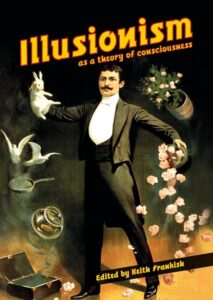When we start to reflect on our own minds, we can quickly be drawn to a mesmerising picture. This picture presents the mind as sort of inner world: a private landscape within which our thoughts, sensations, emotions, and other mental phenomena are located.
One interesting feature of this inner landscape is that it appears to be inaccessible to others. No one else can enter my mind and access my thoughts and feelings along with me. Rather, they must infer how things are with me from observation of my outward behaviour.
Another feature of these private worlds is that they are inescapable. In effect, we each live out our life in solitary confinement. No one can step outside the world of their own private experience and encounter the world as it is in itself. Rather, we must infer how things outside from observation of our inner experience.
This picture of minds as private bubbles has captivated many writers and artists. Orson Welles writes:
We’re born alone, we live alone, we die alone. Only through our love and friendship can we create the illusion for the moment that we’re not alone.
The Portuguese poet Pessoa adds that our rich inner life is not only private, it is also incommunicable:
The abyss from soul to soul cannot be bridged
By any skill of thought or trick of seeming.
Whether we write or speak or do but look
We are ever unapparent. What we are
Cannot be transfused into word or book…
However much we give our thoughts the will
To be our soul and gesture it abroad,
Our hearts are incommunicable still.
What draws us into thinking of our minds in this depressing way?
“There’s Something It’s Like to Have Conscious Experiences”
When contemporary philosophers think about the mind, they often start with the thought that what distinguishes us conscious beings from unconscious bricks is that there’s something it’s like to be us, whereas there’s nothing it’s like to be a brick.
But what is it like to be conscious? I can enjoy a wide range of conscious experiences – the smell of a rose, the red of a sunset, the taste of salt, an agonising pain. It seems that there is, in each case, something it’s like for me to have that experience: something upon which I can focus my attention. However, I can’t show you what it’s like. I alone have access to the internal, subjective character of my own experience.
Of course, consciousness isn’t restricted to humans. The philosopher Thomas Nagel famously asked, “What is it like to be a bat?” Presumably there’s something it’s like to experience the world as a bat does, using sound to navigate through the darkness. But it seems we can never know what it’s like. Nagel suggests that, even if we were to dissect bats and find out every last fact about what goes on inside them physically, we still wouldn’t know what experiences are like for the bat. The internal qualitative character of their experience would remain hidden.
The privacy of these inner worlds is a peculiar sort. We are not talking about the privacy of a physical space. My brain is hidden from others, of course, because it is inside my skull. But a surgeon could cut a hole in my skull and peek inside. The barrier around my mind, on the other hand, is unbreachable. It is, if you like, a metaphysical barrier. The very nature of the mind means no one can access my subjective experiences. You and I might have exactly the same visual experience—a vivid patch of red in the middle of our visual field—but I can’t experience your red patch, and you can’t experience mine.
Three Classic Philosophical Problems
I have sketched out a picture of the mind as a sort of private world. Once we embrace this picture, we are likely to be struck by several classic philosophical problems:
First, the Problem of Other Minds. Given that I can never access other mind of another, only their outward physical features and behaviour, how can I know that there exist minds other than my own? In reply, you might say, “Well, my behaviour has a mind behind it, so it’s reasonable to assume their similar behaviour has a mind behind it too.” But this would be like opening one oyster, discovering a pearl, and concluding all the other oysters must contain pearls too. It’s not reasonable generalize on the basis of a single case. And yet, when it comes to minds, a single case is all any of us can observe.
A second classic problem generated by our picture of the mind as a private inner kingdom is The Problem of The External World. If all I have access to, directly, is the shifting veil of sensory appearance with which I’m immediately presented, how can I know what lies beyond? Perhaps my experiences are caused, not by an external world of trees, mountains, and planets, but by some sort of powerful deceiver: a malicious demon, perhaps, or the supercomputer in The Matrix. Because I can’t peek round the side of my experiences to check what’s actually causing them, I can’t know.
A third classic philosophical problem generated by our picture is The Mind/Body Problem. If minds are to have physical effects, then it seems they need to be part of the physical world. And yet, on our picture, my mind appears to possess properties no mere physical thing could have. How could one conceivably create this – the private, technicolour inner world of which I am now directly aware – by weaving together bits of non-conscious physical matter? No matter how ingenious and complex the arrangement of those physical parts – the atoms and molecules, the living cells – it seems the project cannot possibly succeed. Trying to build a mind out of matter is like trying to build Beethoven’s Ninth Symphony out of Lego bricks. It can’t be done.
Philosophers have grappled with these problems and suggested many different solutions. What I want to explore here is a radical solution suggested in the later work of the philosopher Ludwig Wittgenstein.
Wittgenstein’s Radical Approach
In what sense is Wittgenstein’s approach to these problems radical? Rather than offer solutions to our three problems, he proposes that they don’t need solutions because they are, in reality, only pseudo-problems. They are generated by a deeply confused picture – our picture of the mind as a private inner world. Philosophical progress requires we reject the picture. Once we recognise that the private mind is actually an illusion, the problems dissolve away.
The view that the private mind is an illusion has since come to be known as illusionism. Illusionism has a number of high-profile defenders in the philosophy of mind, including Keith Frankish (who edited an excellent collection entitled Illusionism as a Theory of Consciousness).

Notice, however, that illusionism is not that radical. It’s often misunderstood as the view that consciousness, minds, thoughts, feelings, etc. don’t exist. However, illusionism doesn’t claim these things are illusory. Nor need illusionists deny that there’s “something it’s like” to be in pain. Pain can certainly be unpleasant, excruciating, debilitating, stabbing, throbbing, and so on.
All the illusionist denies is that there is anything private about minds and what goes on in them. According to the illusionist, minds aren’t essentially private; they’re essentially public.
Illusionism comes in at least two forms. In a more recent version (of the sort developed by Frankish), the misleading impression that you have access to a private inner world is best explained psychologically. However, the Wittgensteinian version of illusionism I want to introduce here provides a different diagnosis. This version says that our picture of the mind as a private inner world is a product of linguistic confusion.
Examples of Linguistic Confusion
Let’s begin with an analogy. We cannot move the King forward five places in a game of chess. What we mean by “playing chess” is playing according to the rules of the game, and one of those rules prohibits moving the King in that way.
However, we can imagine someone getting confused about this. They ask, “But if this is something I cannot do, then something must prevent me from doing it. Just as a locked door prevents me from entering a room, and gravity prevents me from jumping 100 feet in the air, so something prevents also me from moving the King five places forward in a game of chess. Yet what prevents me seems stronger than any physical barrier, which might always be knocked down. I must come up against some sort of super-barrier – a metaphysical barrier – that prevents me from doing this.”
Of course, this person’s “metaphysical barrier” is illusory. “Moving the King five places forward in a game of chess” is not a description of a situation reality somehow prevents from occurring. And yet, if we lose sight of how the term “King” and so on are used, we might be seduced into believing it is.

Here’s another illustration. I cannot paint a Bob Ross painting. Only Bob Ross (the TV artist who taught millions how to paint landscapes) can do that. I can a best produce a really good copy or a fake. The constraint that seemingly prevents me painting a Bob Ross is really in our language. A “Bob Ross painting” just means that it’s painted by Bob Ross. So, trivially, if someone else paints it, it’s not a Bob Ross. But if I fail to recognise these facts about linguistic practice, I might end up seduced into thinking there’s some sort of metaphysical super-barrier that prevents me painting a Bob Ross.
But then what about my feeling your pain? On the picture of the mind we’ve been exploring, I am prevented from doing this. Only it’s not a physical barrier, like your skull that prevents me: it’s a metaphysical barrier. Necessarily, no one else can enter your private world and have your experiences along with you.
But now notice that this metaphysical barrier sounds suspiciously like the illusory metaphysical barriers described above. Might the metaphysical barrier around the mind also be an illusion generated by not paying sufficient attention to how language is being used?
How might the illusion be generated? Here’s one suggestion. Suppose my nervous system is somehow connected to your hand, so that we can both a feel a pain in the palm of your hand. Would we feel the very same pain? Wittgenstein considers just this scenario:
‘We feel pain in the same place, in the same body, our descriptions tally, but still my pain can’t be his’, I suppose as a reason you will be inclined to say: ‘because my pain is my pain and his pain is his pain’. And here you are making a … statement about the use of such a phrase as ‘the same pain’. You say that you don’t wish to apply the phrase, ‘he has got my pain’ or ‘we both have the same pain’, and instead, perhaps, you will apply such a phrase as ‘his pain is exactly like mine’.
Wittgenstein’s point here is that if we say, as philosophers and others regularly do, that one person cannot experience another’s pain, or visual experience, or emotion, only one exactly like it, then that will be the result of our having a certain linguistic practice. But then nothing physical, physiological, psychological or metaphysical prevents me from accessing your experiences, just as nothing prevents me from painting a Bob Ross painting.
If the metaphysical barrier around the mind is an illusion, then so is the world that it circumscribes. The mind, thought of as an inner world delineated by an unbreachable metaphysical barrier, would be a linguistic illusion.
I am here trying to loosen the grip of our picture of minds as private inner world, by providing one simple illustration of how the illusion of such a world might be generated. However, according to Wittgenstein, the linguistic confusions that can lead us into thinking of minds as such private kingdoms are many.
“The Great Difficulty”
If the private world with its private objects is an illusion, it is an extraordinarily seductive one. It’s particularly tempting to think that what we mean by words like “pain” and “red” is fixed at least in part by our focussing our attention on the contents of our private worlds. As Wittgenstein says,
The great difficulty here is not to present the matter as if there were something one couldn’t do. As if there really were an object, from which I extract a description, which I am not in a position to show anyone.
But isn’t Wittgenstein denying the obvious? “Surely,” you might think, “I can be more confident these private objects exist than that the external world exists. Maybe I’m currently dreaming and there’s no sunset out there. That this intense patch of red and yellow in my internal visual field exists is something about which I can be much more certain.”
Certainly, it might be easy to convince ourselves that the existence of private objects is just obvious and undeniable, even if they were illusory.

Imagine someone looking at a sunset through an open window. They think to themselves, “My perception of that sunset is clearly mediated by an object in the window. After all, when I move my head, that – the coloured object in the window frame upon which I am now focussing my attention – changes its shape and position within the frame, yet the sunset did not move. So what I’m focussed on can’t be the sunset. In fact, that coloured object in the window might still exist even if the sunset doesn’t (for perhaps there’s nothing beyond that window, or outside this room).”
The truth, of course, is that there is no coloured object in the window. The window frame is empty, and this person has simply focussed their attention on the sunset. Similarly, even if we don’t have access to private objects, it might not be difficult to persuade ourselves that we do: “Of course I have private objects—I am focussing my attention not on the sunset out there but on this—the private, coloured patch in my internal visual field. In fact, I can be more certain the private object exists than that the sunset exists!” The truth, again, may be that the apparent object is an illusion, and I’m just focussing my attention on the sunset.
According to Wittgenstein, our picture of the mind as a private inner world is a product of linguistic confusion:
A picture held us captive. And we could not get outside it, for it lay in our language and language seemed to repeat it to us inexorably.
How plausible is Wittgenstein’s version of illusionism? I’ll leave you to make up your own mind. Currently it’s philosophically unfashionable. But fashions change, and what is rejected as absurd at one time can later become popular. My own view is that whether or not it’s ultimately correct, Wittgensteinian illusionism deserves to be taken much more seriously than it is.
Stephen Law is Director of the CertHE and Director of Studies in Philosophy, Oxford University Department of Continuing Education, and author of popular philosophy books including The Philosophy Gym: 25 short adventures in thinking.
Get to know the experts behind your favorite articles on Templeton Ideas. Meet our authors here.
